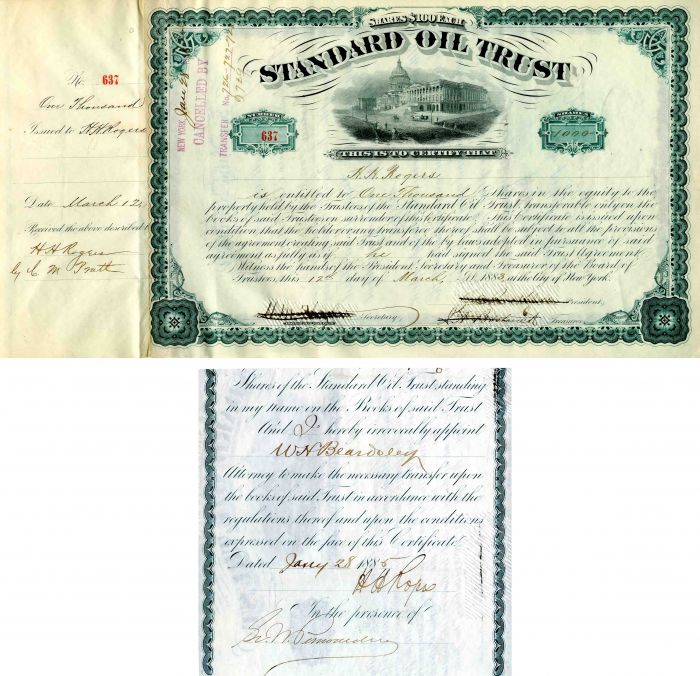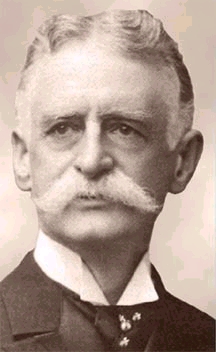Standard Oil Trust Issued to and signed by Henry H. Rogers - Signed by John D. Rockefeller, Henry M. Flagler and Henry H. Rogers - 1883 dated Autograph Stock Certificate
Inv# AG2319 Stock
Stock issued to and signed on back by H.H. Rogers and W.H. Beardsley. Also signed by H.M. Flagler and J.D. Rockefeller. 1,000 Shares! Rare!

Henry Huttleston Rogers (1840-1909) was born into a working-class family in Mattapoisett, Massachusetts. He was the offspring of Rowland Rogers and Mary Eldredge Huttleston Rogers, both of whom traced their ancestry back to the pilgrims who arrived in the 17th century on the Mayflower. Notably, his mother's family had previously used the spelling 'Huddleston' instead of 'Huttleston,' leading to frequent misspellings of Henry Rogers' name using this earlier variant. In 1861, at the age of 21, Henry combined his savings of around $600 with a friend, Charles P. Ellis, to venture into the newly discovered oil fields of western Pennsylvania. After borrowing an additional $600, the young entrepreneurs established a small refinery in McClintocksville, near Oil City, which they named Wamsutta Oil Refinery. In 1870, John D. Rockefeller founded the Standard Oil Company of Ohio and initiated a strategy to acquire competitors and consolidate oil refining under a single entity. During this time, the interests of Pratt and Henry Rogers were incorporated into Standard Oil, which by 1878 controlled approximately 90% of the refining capacity in the United States. In early 1871-72, H. H. Rogers was employed by Pratt and Company, where he and other refiners became embroiled in a dispute with John D. Rockefeller, Samuel Andrews, and Henry M. Flagler, as well as the notorious South Improvement Company. This company was essentially a scheme to secure secret advantageous net rates from Tom Scott of the Pennsylvania Railroad and other railroads through undisclosed rebates, which incited outrage among many independent oil producers and refinery owners, both near and far.

Henry Morrison Flagler (1830-1913) encountered John D. Rockefeller through the grain and distillery industry in Bellevue, Ohio. Following a setback in his salt manufacturing business in Saginaw, Michigan, he relocated to Cleveland, where he partnered with Rockefeller and chemist Samuel Andrews to establish Rockefeller, Andrews & Flagler in 1867, which later evolved into Standard Oil. By 1872, this company dominated the American oil refining sector, producing 10,000 barrels daily. In 1877, Standard Oil relocated its headquarters to New York City, prompting Flagler and his family to move there as well. He was joined by Henry H. Rogers, another prominent figure in Standard Oil, who also contributed to the development of American railroads, including those on Staten Island, the Union Pacific Railroad, and later in West Virginia, where he constructed the notable Virginian Railway to transport coal to Hampton Roads, Virginia. However, Flagler's pursuits outside of Standard Oil diverged from those of Rogers. In 1878, on his physician's recommendation, Flagler traveled to Jacksonville, Florida for the winter with his first wife, Mary (née Harkness) Flagler, who was gravely ill. After her passing in 1881, he remarried Ida Alice (née Shrouds) Flagler, who had cared for Mary. Following their marriage, the couple visited St. Augustine, Florida, where Flagler found the city appealing but noted the inadequacy of hotel accommodations and transportation. Recognizing Florida's potential to draw visitors from other states, he returned to St. Augustine in 1885 and initiated the construction of the 540-room Hotel Ponce de Leon. Aware of the necessity for a reliable transportation network to support his hotel projects, Flagler acquired the Jacksonville, St. Augustine and Halifax Railroad, marking the inception of what would be known as the 'Flagler System' or the Florida East Coast Railway.

John Davison Rockefeller (1839-1937) was the founder and one of the initial partners of Standard Oil, a pioneer in the oil industry and a prominent capitalist. Once regarded as the wealthiest individual in the world, Rockefeller commenced his career as a successful merchant in Cleveland, Ohio, before the Civil War. In 1863, he and his associates established a refinery that evolved into a business which ultimately absorbed numerous other refineries in Cleveland and expanded into the oil fields of Pennsylvania, becoming the largest refining enterprise globally. During this period, he managed to grow his operations while others faltered, thanks to the skilled individuals he employed, the operational efficiency he implemented, and various business practices that are now deemed unethical, for which he gained notoriety. In 1870, Rockefeller founded the Standard Oil Company of Ohio to enhance the efficiency of his operations. In 1882, partly to streamline operations and partly to circumvent state regulations, he made a significant move in American business history by establishing the Standard Oil Trust. This arrangement involved a board of trustees taking control of the stock of both the Standard Oil Company of Ohio and its subsidiaries, managing the conglomerate through the board's executive committee. By this time, public disapproval of Rockefeller and his practices was escalating, and in 1892, the Ohio Supreme Court dissolved the Trust. It was subsequently divided into approximately 18, later over 30, corporations before being incorporated into another holding company, Standard Oil of New Jersey, in 1899. In 1911, the U.S. Supreme Court mandated the dissolution of this company, labeling it as 'a monopoly in restraint of trade' and thus illegal under the Sherman Anti-Trust Act. By this stage, Rockefeller had largely distanced himself from business activities, focusing exclusively on his philanthropic endeavors.
A stock certificate is issued by businesses, usually companies. A stock is part of the permanent finance of a business. Normally, they are never repaid, and the investor can recover his/her money only by selling to another investor. Most stocks, or also called shares, earn dividends, at the business's discretion, depending on how well it has traded. A stockholder or shareholder is a part-owner of the business that issued the stock certificates.










Ebay ID: labarre_galleries